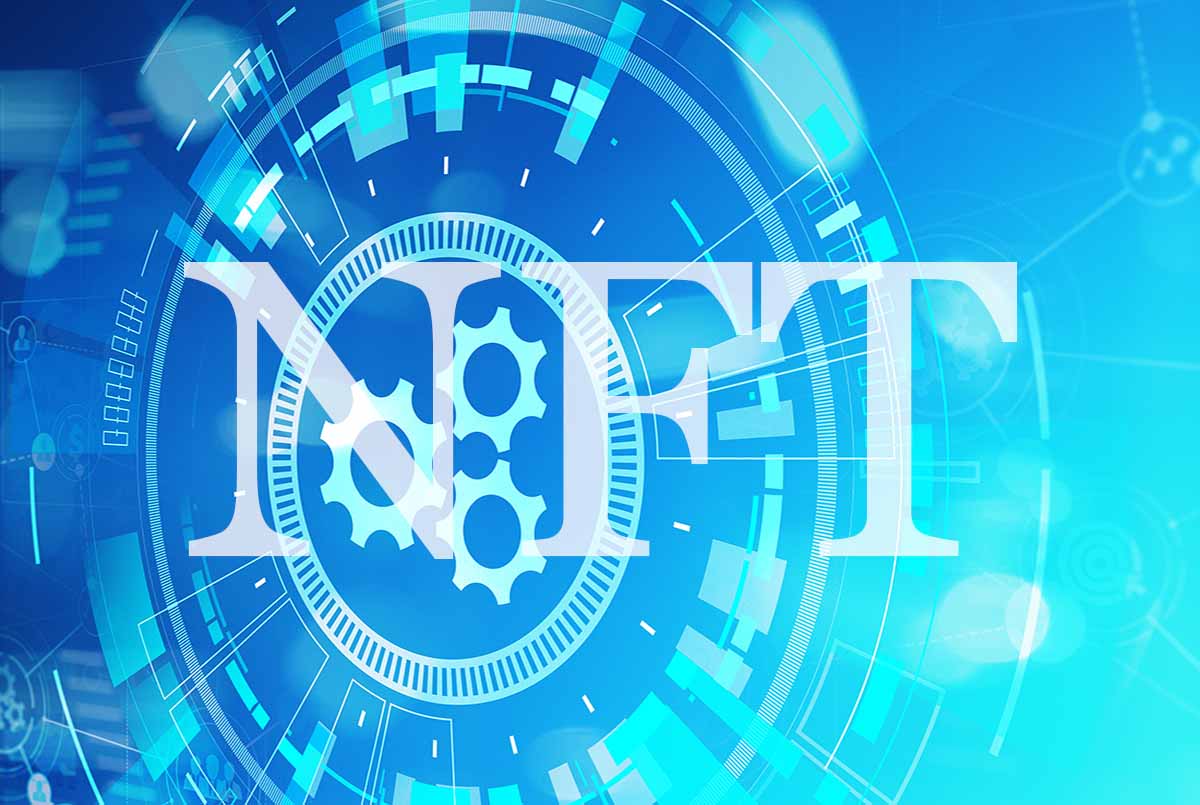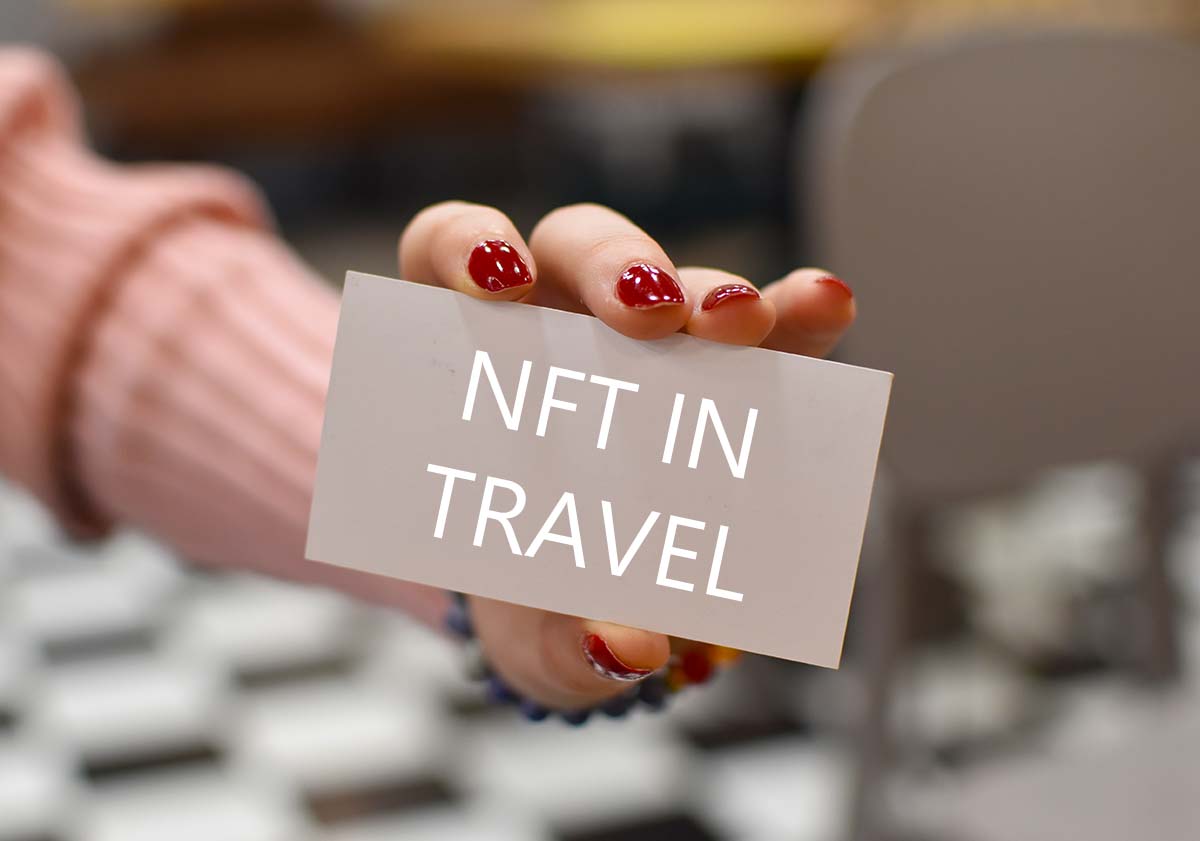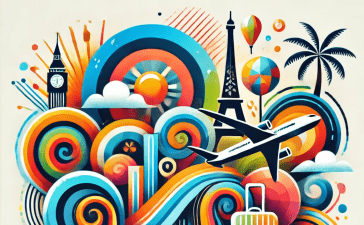NFT, Metaverse, blockchain, cryptocurrency, Web 3—so many words and so much fuss around them. While we are slowly getting used to these buzzwords, an innovation appears on the horizon: NFT in travel. How is it possible to combine these two notions: NFTs and Travel? and what is the future of the travel industry amid digitization and the era of virtual reality? How will travel benefit from emerging NFT technology? Is NFT the future of the travel industry? We are here to discuss those and many other questions.
NFTs explained
NFT, a non-fungible token, appeared in the blockchain as a digital asset or “thing” you can buy or sell within a blockchain. NFT can be an image, music, art, video, in-game item, and more. Those assets are well protected on the blockchain, can be traded indefinitely, and are backed up by blockchain technology.

You will probably be surprised to learn that NFTs have been around since 2014, but only in the last couple of years have they made a big noise when art was transformed into digital art and later into an NFT. The NFT market skyrocketed in 2021 and is projected to reach $211.72 billion by 2030.
With the expanse of the Metaverse and virtual reality, the NFT market will grow even faster. You can now buy virtual spaces within the Metaverse and decorate them with virtual assets. This world has no boundaries, physical or imaginative. We have already stepped into a new reality, and there is no way back.
5 ways the travel industry can use NFT technology
While the travel industry is actively and widely implementing modern digital technologies like online booking and purchasing, the new era will bring the Metaverse and NFT to the industry. Tourists will be able to travel virtually (but not be forced to stay in virtual reality), communicate with each other, buy and sell travel-related items, and more. Here are the top 5 ways businesses can already incorporate NFTs into the travel experience.
Loyalty programs to ensure repeat business
NFTs can be used as part of loyalty programs to incentivize repeat business. By rewarding customers with exclusive NFTs for their loyalty, travel companies can create a sense of exclusivity, enhance the overall customer experience, and ensure long-lasting relationships. The companies, which already leverage loyalty programs, will aim to update them with NFT technology.
Partnerships with digital art creators
NFTs have become more popular worldwide through digital assets, so why not use this trend to promote travel-related businesses? The best way is to partner with digital art creators to create unique NFTs that represent specific destinations, experiences, or even travel-related products. By doing so, travel companies can create a new revenue stream while providing their customers with unique digital assets with real-world value.
Raising funds with NFTs
NFT can become a new funnel for travel companies to raise funds for new projects or initiatives. By creating exclusive NFTs, businesses can provide their customers with a new way to invest in the company while also receiving a valuable digital asset in return. This can be particularly useful for small and midsized travel companies that may not have access to traditional funding sources. Selling NFT content may also become a new source of profit for companies.
Exclusive NFT travel experiences
Travel companies can create exclusive NFT travel experiences and run auctions on the blockchain that can be purchased with cryptocurrency. For example, a travel company can create an NFT that represents ownership of a private tour of a historic landmark or a luxury cruise. These experiences can be sold to the highest bidder, delivering a new level of exclusivity for high-end travelers: absolutely new experience and a new passion for a narrow group of people seeking new emotions.
NFT tickets and keys
Finally, the soon-to-be new normal is NFT airfares and hotel room keys that can be purchased, enabled on the blockchain, and kept secure. In both cases, the NFT serves as proof of ownership and allows the customer to access the asset they have purchased. The use of NFTs can also provide additional benefits, such as enhanced security and the ability to transfer ownership or resell the asset.

5 Benefits of NFTs in the travel industry
Innovative technologies are exceptionally beneficial for the travel industry, facilitating processes, providing extra comfort for travelers, and creating new experiences for businesses and tourists. NFT has come to double the benefits or add an absolutely new layer to them.
Improved marketing
Considered to be one of the fastest-growing age groups of travelers, Gen Z loves technology and uses smartphones for almost everything. NFTs provide an excellent opportunity for travel companies to differentiate their products and services in a crowded market, thus grabbing the attention of a vast group of target audiences.
By leveraging any of the implementation forms of NFT technology into businesses, travel companies can create unique experiences, such as access to VIP lounges or behind-the-scenes tours, and gain customer loyalty. Additionally, NFTs can be used to promote travel destinations and experiences, making them more attractive to potential customers.
Better travel experience
As a valuable data source, travel agencies can collect, monitor, and analyze travelers’ behavior and movements while exploiting destinations within a blockchain. This is a new source of database and data collection and a new way to improve the travel experience. To increase engagement, travel agencies can enable “proof of travel:” journey tracking for travelers. We do love to mark places we’ve been and things we’ve done as an approval of our success, and this technique can definitely win hearts.
Streamlined bookings
One typical implementation of NFT is streamlining the booking process by allowing customers to purchase travel-related assets, such as hotel rooms or transportation, directly on the blockchain. The technology will surely eliminate the role of intermediaries, reduce costs, and improve efficiency.
Brand Building
Another way to stand out in the travel industry is to create branded digital assets that customers can collect and trade. These NFTs can be used to promote travel destinations, experiences, and products, further enhancing the overall customer experience.
Security and authenticity
NFTs provide a secure and transparent way to verify the ownership and authenticity of travel-related assets. This can help prevent fraud and provide peace of mind to customers who purchase travel-related products and services.
Final words: The future of NFT in travel
Progress is unstoppable. With sustainability and a low-carbon future promoted across industries, NFT will definitely secure its place in the travel industry to raise awareness and support conservation efforts in travel destinations.
While we still value real experiences and emotions, we can’t simply ignore processes in a parallel reality. The best thing we can do is embrace progress and use it to advance ourselves and our experiences at the same time supporting sustainability.
Some fear the evolution of artificial intelligence, metaverses, and virtual reality. Those, who are ready for transformation will benefit from innovations, and NFT is just one part of it.
What are my expectations?
As an explorer and transformation-ready person, I’m open to NFT in travel and generally in our lives if only it may have a positive impact on the planet and eliminate resource consumption. If NFT travel means less paperwork, less energy consumption, and streamlined processes, then I’m in. The only fear is that people will be too much dragged into virtual reality, forgetting about real emotions when traveling. Let’s be open to innovations and still feel the ground under our feet.
What about you? Would you stick to traditional physical values or you are ready to indulge in technologies?
Info Central

NFT airfares and hotel room keys are a way for travel companies to use NFTs to sell and manage travel-related assets. Here’s how they work:
NFT airfares:
- A travel company issues an NFT representing an airfare to a customer who purchases it.
- The NFT contains information such as the customer’s name, flight details, and the price paid for the ticket.
- The customer can then use the NFT to redeem the ticket when they travel.
NFT hotel room keys:
- A hotel issues an NFT representing a room key to a customer who books a stay.
- The NFT contains information such as the customer’s name, the room number, and the dates of the stay.
- The customer can then use the NFT to access their room during their stay.
In both cases, the NFT serves as proof of ownership and allows the customer to access the asset they have purchased. The use of NFTs can also provide additional benefits, such as enhanced security and the ability to transfer ownership or resell the asset.








